University Business Law Assignment: Agency and Corporate Issues
VerifiedAdded on 2021/06/18
|10
|2260
|68
Homework Assignment
AI Summary
This assignment solution addresses two key legal questions related to business law. The first question explores agency law, focusing on the doctrine of election in the context of an undisclosed principal, the liability of a principal for an agent's actions exceeding authority, and the consequences of terminating an agency relationship without proper notification. The analysis applies legal principles to scenarios involving contracts and the responsibilities of employers and employees. The second question delves into corporate law, examining the concept of separate legal entity established in Salomon v A Salomon & Co Ltd and the circumstances under which the corporate veil can be lifted, as well as the powers and limitations of the Australian Securities and Investments Commission (ASIC) in company registration, especially when related to individuals with criminal convictions and their ability to hold directorships and licenses. The solution provides a detailed legal analysis of the issues, referencing relevant case law and statutory provisions.
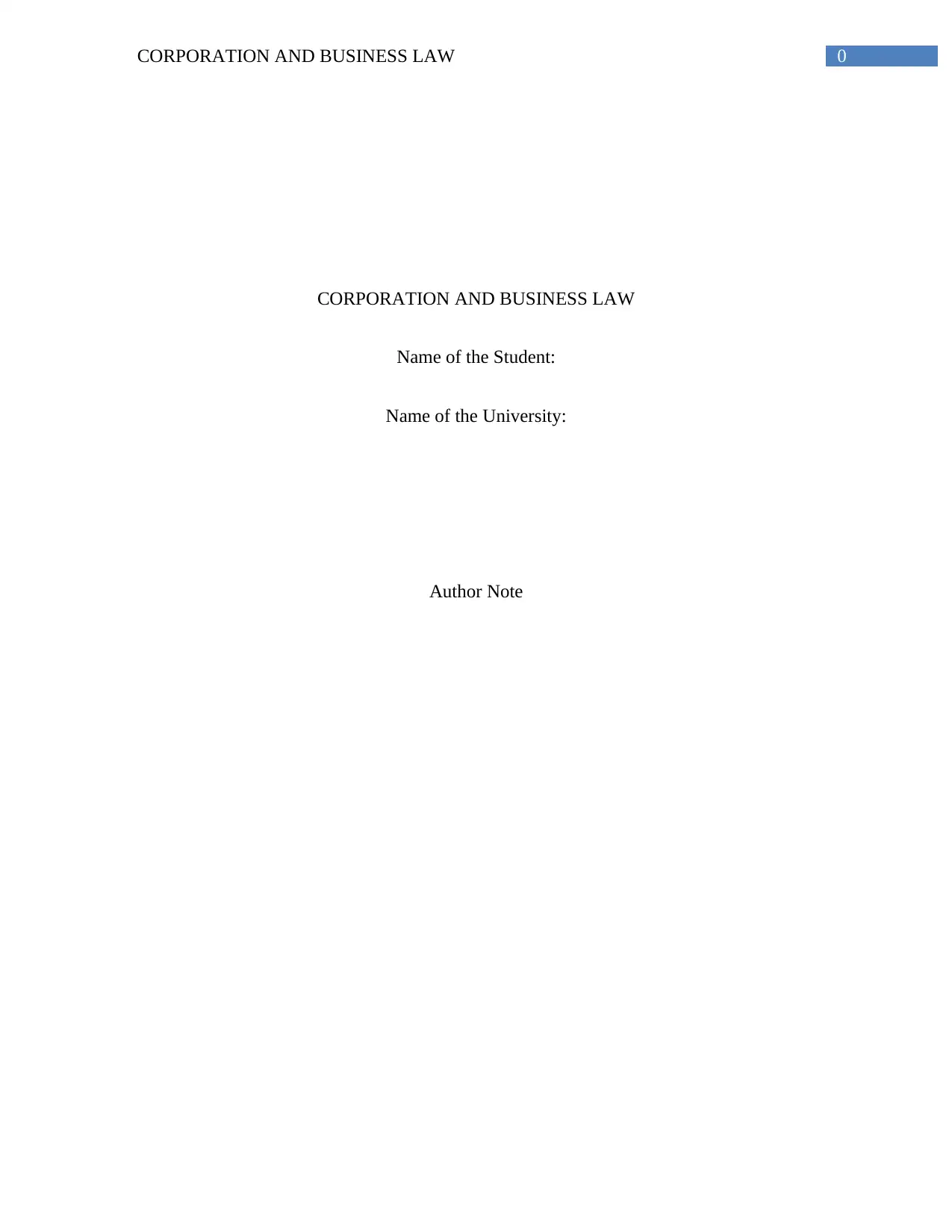
0CORPORATION AND BUSINESS LAW
CORPORATION AND BUSINESS LAW
Name of the Student:
Name of the University:
Author Note
CORPORATION AND BUSINESS LAW
Name of the Student:
Name of the University:
Author Note
Paraphrase This Document
Need a fresh take? Get an instant paraphrase of this document with our AI Paraphraser
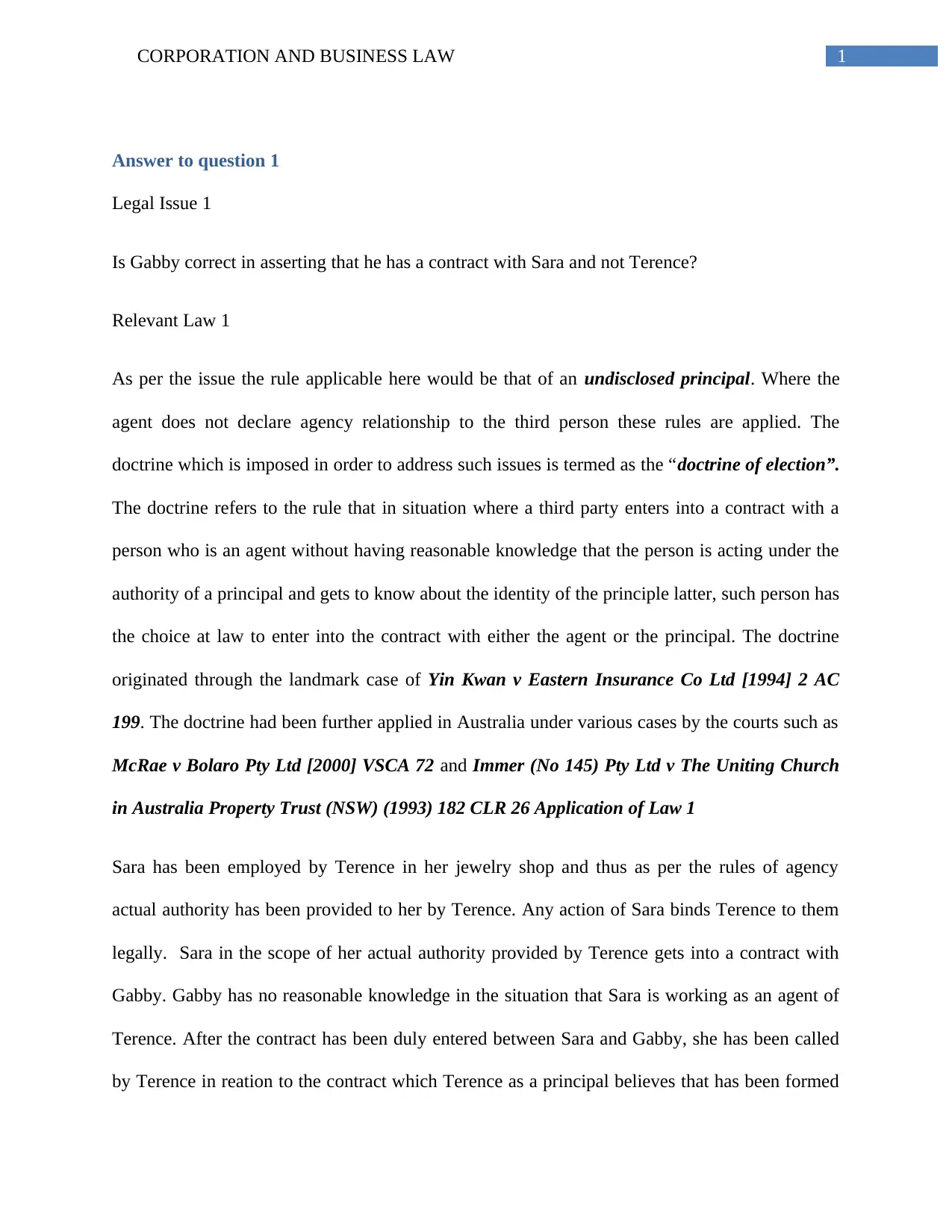
1CORPORATION AND BUSINESS LAW
Answer to question 1
Legal Issue 1
Is Gabby correct in asserting that he has a contract with Sara and not Terence?
Relevant Law 1
As per the issue the rule applicable here would be that of an undisclosed principal. Where the
agent does not declare agency relationship to the third person these rules are applied. The
doctrine which is imposed in order to address such issues is termed as the “doctrine of election”.
The doctrine refers to the rule that in situation where a third party enters into a contract with a
person who is an agent without having reasonable knowledge that the person is acting under the
authority of a principal and gets to know about the identity of the principle latter, such person has
the choice at law to enter into the contract with either the agent or the principal. The doctrine
originated through the landmark case of Yin Kwan v Eastern Insurance Co Ltd [1994] 2 AC
199. The doctrine had been further applied in Australia under various cases by the courts such as
McRae v Bolaro Pty Ltd [2000] VSCA 72 and Immer (No 145) Pty Ltd v The Uniting Church
in Australia Property Trust (NSW) (1993) 182 CLR 26 Application of Law 1
Sara has been employed by Terence in her jewelry shop and thus as per the rules of agency
actual authority has been provided to her by Terence. Any action of Sara binds Terence to them
legally. Sara in the scope of her actual authority provided by Terence gets into a contract with
Gabby. Gabby has no reasonable knowledge in the situation that Sara is working as an agent of
Terence. After the contract has been duly entered between Sara and Gabby, she has been called
by Terence in reation to the contract which Terence as a principal believes that has been formed
Answer to question 1
Legal Issue 1
Is Gabby correct in asserting that he has a contract with Sara and not Terence?
Relevant Law 1
As per the issue the rule applicable here would be that of an undisclosed principal. Where the
agent does not declare agency relationship to the third person these rules are applied. The
doctrine which is imposed in order to address such issues is termed as the “doctrine of election”.
The doctrine refers to the rule that in situation where a third party enters into a contract with a
person who is an agent without having reasonable knowledge that the person is acting under the
authority of a principal and gets to know about the identity of the principle latter, such person has
the choice at law to enter into the contract with either the agent or the principal. The doctrine
originated through the landmark case of Yin Kwan v Eastern Insurance Co Ltd [1994] 2 AC
199. The doctrine had been further applied in Australia under various cases by the courts such as
McRae v Bolaro Pty Ltd [2000] VSCA 72 and Immer (No 145) Pty Ltd v The Uniting Church
in Australia Property Trust (NSW) (1993) 182 CLR 26 Application of Law 1
Sara has been employed by Terence in her jewelry shop and thus as per the rules of agency
actual authority has been provided to her by Terence. Any action of Sara binds Terence to them
legally. Sara in the scope of her actual authority provided by Terence gets into a contract with
Gabby. Gabby has no reasonable knowledge in the situation that Sara is working as an agent of
Terence. After the contract has been duly entered between Sara and Gabby, she has been called
by Terence in reation to the contract which Terence as a principal believes that has been formed
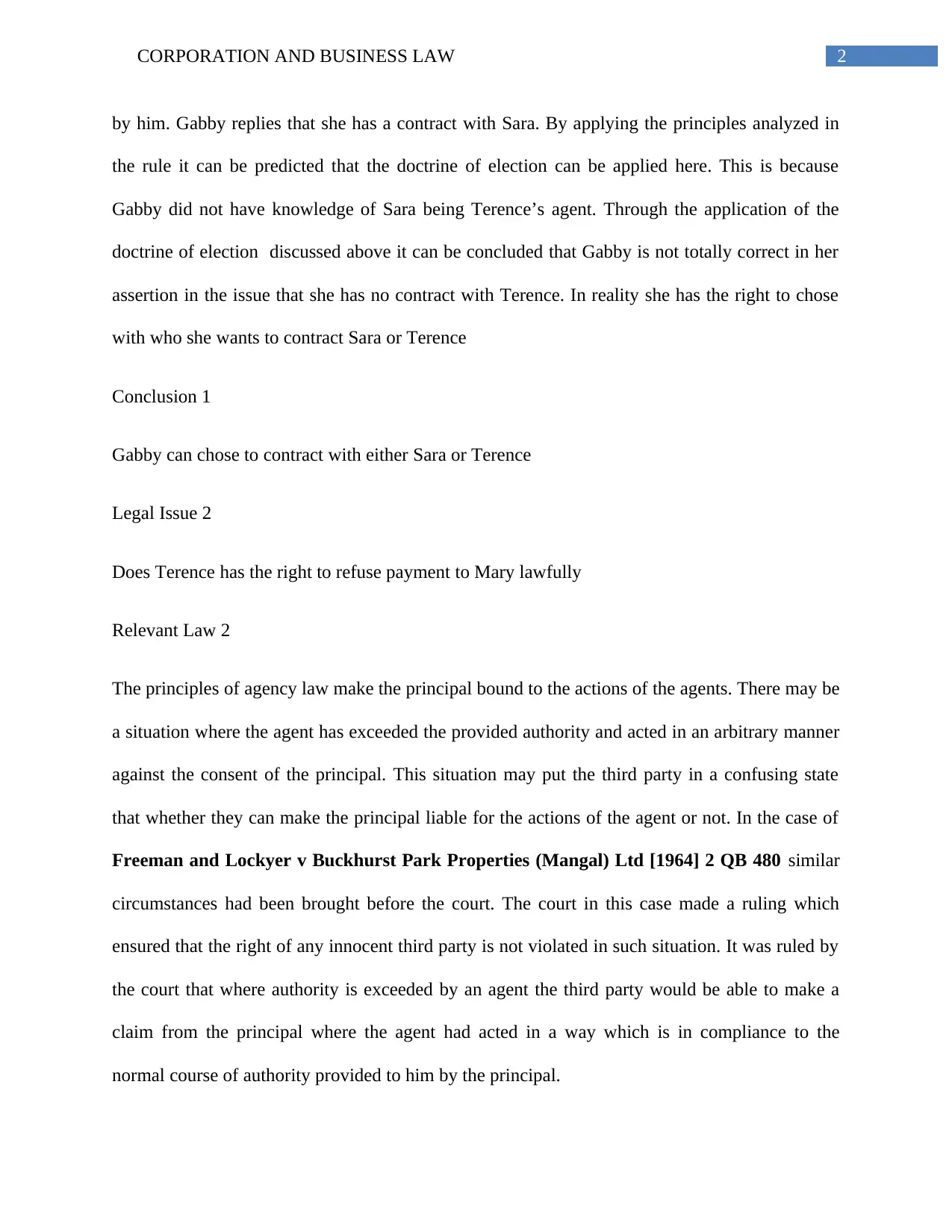
2CORPORATION AND BUSINESS LAW
by him. Gabby replies that she has a contract with Sara. By applying the principles analyzed in
the rule it can be predicted that the doctrine of election can be applied here. This is because
Gabby did not have knowledge of Sara being Terence’s agent. Through the application of the
doctrine of election discussed above it can be concluded that Gabby is not totally correct in her
assertion in the issue that she has no contract with Terence. In reality she has the right to chose
with who she wants to contract Sara or Terence
Conclusion 1
Gabby can chose to contract with either Sara or Terence
Legal Issue 2
Does Terence has the right to refuse payment to Mary lawfully
Relevant Law 2
The principles of agency law make the principal bound to the actions of the agents. There may be
a situation where the agent has exceeded the provided authority and acted in an arbitrary manner
against the consent of the principal. This situation may put the third party in a confusing state
that whether they can make the principal liable for the actions of the agent or not. In the case of
Freeman and Lockyer v Buckhurst Park Properties (Mangal) Ltd [1964] 2 QB 480 similar
circumstances had been brought before the court. The court in this case made a ruling which
ensured that the right of any innocent third party is not violated in such situation. It was ruled by
the court that where authority is exceeded by an agent the third party would be able to make a
claim from the principal where the agent had acted in a way which is in compliance to the
normal course of authority provided to him by the principal.
by him. Gabby replies that she has a contract with Sara. By applying the principles analyzed in
the rule it can be predicted that the doctrine of election can be applied here. This is because
Gabby did not have knowledge of Sara being Terence’s agent. Through the application of the
doctrine of election discussed above it can be concluded that Gabby is not totally correct in her
assertion in the issue that she has no contract with Terence. In reality she has the right to chose
with who she wants to contract Sara or Terence
Conclusion 1
Gabby can chose to contract with either Sara or Terence
Legal Issue 2
Does Terence has the right to refuse payment to Mary lawfully
Relevant Law 2
The principles of agency law make the principal bound to the actions of the agents. There may be
a situation where the agent has exceeded the provided authority and acted in an arbitrary manner
against the consent of the principal. This situation may put the third party in a confusing state
that whether they can make the principal liable for the actions of the agent or not. In the case of
Freeman and Lockyer v Buckhurst Park Properties (Mangal) Ltd [1964] 2 QB 480 similar
circumstances had been brought before the court. The court in this case made a ruling which
ensured that the right of any innocent third party is not violated in such situation. It was ruled by
the court that where authority is exceeded by an agent the third party would be able to make a
claim from the principal where the agent had acted in a way which is in compliance to the
normal course of authority provided to him by the principal.
⊘ This is a preview!⊘
Do you want full access?
Subscribe today to unlock all pages.

Trusted by 1+ million students worldwide
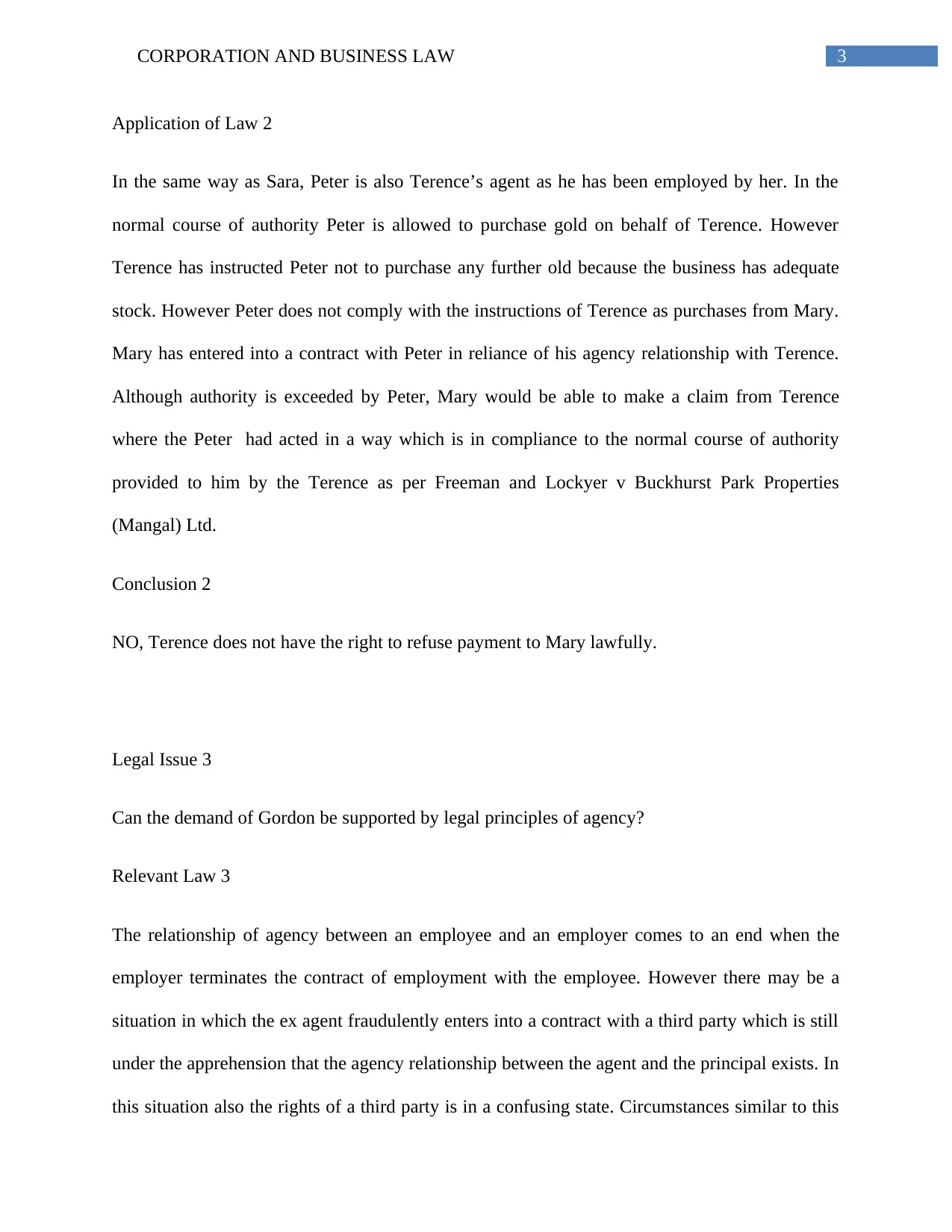
3CORPORATION AND BUSINESS LAW
Application of Law 2
In the same way as Sara, Peter is also Terence’s agent as he has been employed by her. In the
normal course of authority Peter is allowed to purchase gold on behalf of Terence. However
Terence has instructed Peter not to purchase any further old because the business has adequate
stock. However Peter does not comply with the instructions of Terence as purchases from Mary.
Mary has entered into a contract with Peter in reliance of his agency relationship with Terence.
Although authority is exceeded by Peter, Mary would be able to make a claim from Terence
where the Peter had acted in a way which is in compliance to the normal course of authority
provided to him by the Terence as per Freeman and Lockyer v Buckhurst Park Properties
(Mangal) Ltd.
Conclusion 2
NO, Terence does not have the right to refuse payment to Mary lawfully.
Legal Issue 3
Can the demand of Gordon be supported by legal principles of agency?
Relevant Law 3
The relationship of agency between an employee and an employer comes to an end when the
employer terminates the contract of employment with the employee. However there may be a
situation in which the ex agent fraudulently enters into a contract with a third party which is still
under the apprehension that the agency relationship between the agent and the principal exists. In
this situation also the rights of a third party is in a confusing state. Circumstances similar to this
Application of Law 2
In the same way as Sara, Peter is also Terence’s agent as he has been employed by her. In the
normal course of authority Peter is allowed to purchase gold on behalf of Terence. However
Terence has instructed Peter not to purchase any further old because the business has adequate
stock. However Peter does not comply with the instructions of Terence as purchases from Mary.
Mary has entered into a contract with Peter in reliance of his agency relationship with Terence.
Although authority is exceeded by Peter, Mary would be able to make a claim from Terence
where the Peter had acted in a way which is in compliance to the normal course of authority
provided to him by the Terence as per Freeman and Lockyer v Buckhurst Park Properties
(Mangal) Ltd.
Conclusion 2
NO, Terence does not have the right to refuse payment to Mary lawfully.
Legal Issue 3
Can the demand of Gordon be supported by legal principles of agency?
Relevant Law 3
The relationship of agency between an employee and an employer comes to an end when the
employer terminates the contract of employment with the employee. However there may be a
situation in which the ex agent fraudulently enters into a contract with a third party which is still
under the apprehension that the agency relationship between the agent and the principal exists. In
this situation also the rights of a third party is in a confusing state. Circumstances similar to this
Paraphrase This Document
Need a fresh take? Get an instant paraphrase of this document with our AI Paraphraser
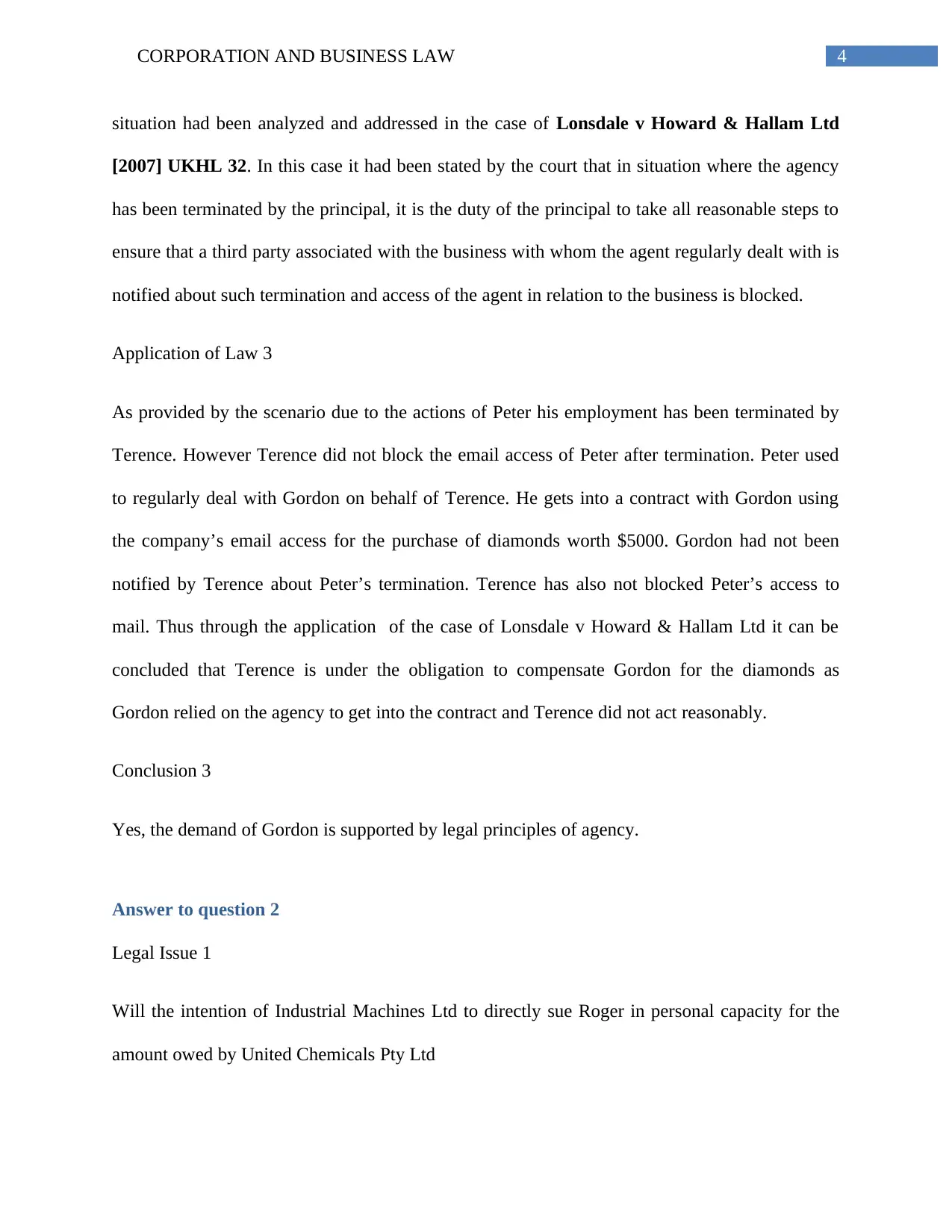
4CORPORATION AND BUSINESS LAW
situation had been analyzed and addressed in the case of Lonsdale v Howard & Hallam Ltd
[2007] UKHL 32. In this case it had been stated by the court that in situation where the agency
has been terminated by the principal, it is the duty of the principal to take all reasonable steps to
ensure that a third party associated with the business with whom the agent regularly dealt with is
notified about such termination and access of the agent in relation to the business is blocked.
Application of Law 3
As provided by the scenario due to the actions of Peter his employment has been terminated by
Terence. However Terence did not block the email access of Peter after termination. Peter used
to regularly deal with Gordon on behalf of Terence. He gets into a contract with Gordon using
the company’s email access for the purchase of diamonds worth $5000. Gordon had not been
notified by Terence about Peter’s termination. Terence has also not blocked Peter’s access to
mail. Thus through the application of the case of Lonsdale v Howard & Hallam Ltd it can be
concluded that Terence is under the obligation to compensate Gordon for the diamonds as
Gordon relied on the agency to get into the contract and Terence did not act reasonably.
Conclusion 3
Yes, the demand of Gordon is supported by legal principles of agency.
Answer to question 2
Legal Issue 1
Will the intention of Industrial Machines Ltd to directly sue Roger in personal capacity for the
amount owed by United Chemicals Pty Ltd
situation had been analyzed and addressed in the case of Lonsdale v Howard & Hallam Ltd
[2007] UKHL 32. In this case it had been stated by the court that in situation where the agency
has been terminated by the principal, it is the duty of the principal to take all reasonable steps to
ensure that a third party associated with the business with whom the agent regularly dealt with is
notified about such termination and access of the agent in relation to the business is blocked.
Application of Law 3
As provided by the scenario due to the actions of Peter his employment has been terminated by
Terence. However Terence did not block the email access of Peter after termination. Peter used
to regularly deal with Gordon on behalf of Terence. He gets into a contract with Gordon using
the company’s email access for the purchase of diamonds worth $5000. Gordon had not been
notified by Terence about Peter’s termination. Terence has also not blocked Peter’s access to
mail. Thus through the application of the case of Lonsdale v Howard & Hallam Ltd it can be
concluded that Terence is under the obligation to compensate Gordon for the diamonds as
Gordon relied on the agency to get into the contract and Terence did not act reasonably.
Conclusion 3
Yes, the demand of Gordon is supported by legal principles of agency.
Answer to question 2
Legal Issue 1
Will the intention of Industrial Machines Ltd to directly sue Roger in personal capacity for the
amount owed by United Chemicals Pty Ltd
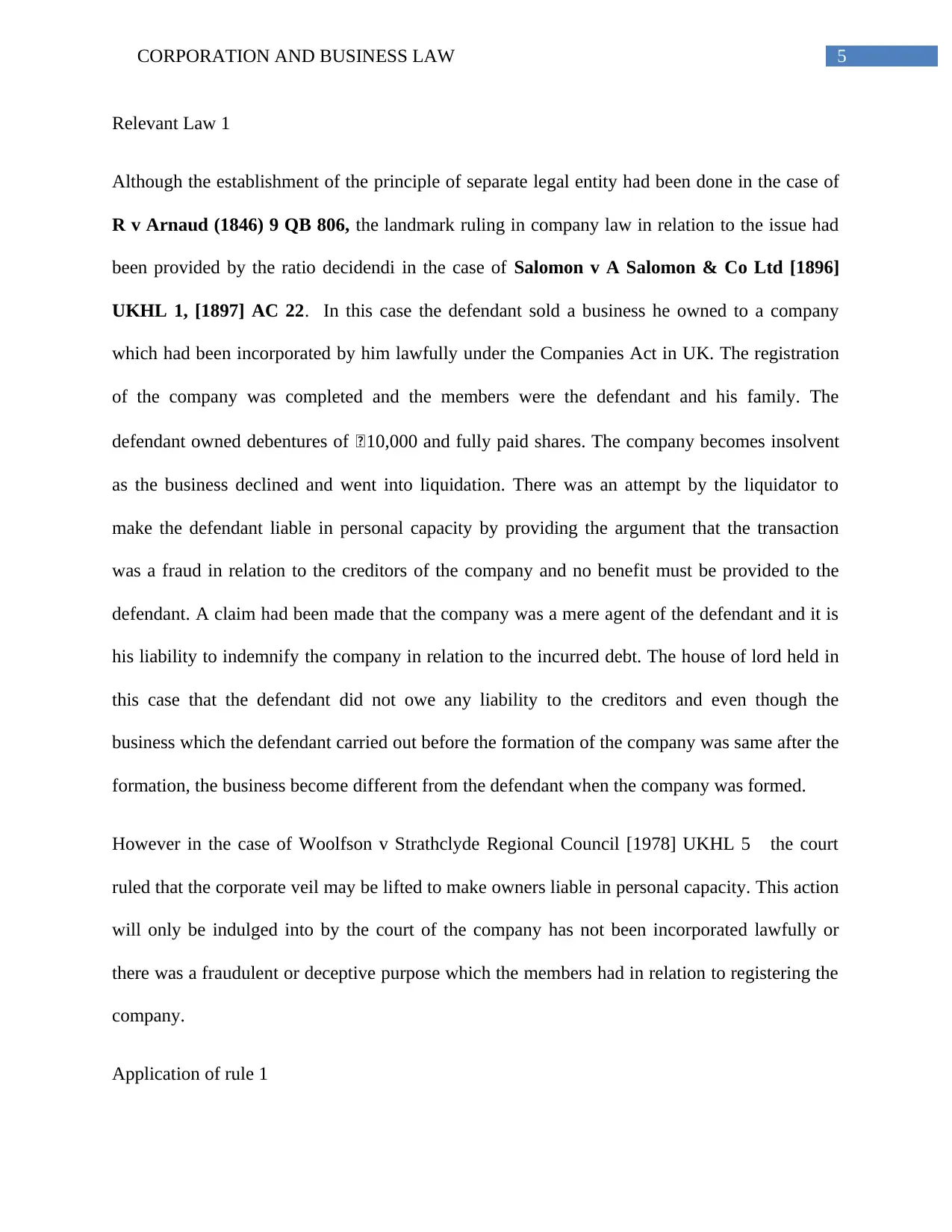
5CORPORATION AND BUSINESS LAW
Relevant Law 1
Although the establishment of the principle of separate legal entity had been done in the case of
R v Arnaud (1846) 9 QB 806, the landmark ruling in company law in relation to the issue had
been provided by the ratio decidendi in the case of Salomon v A Salomon & Co Ltd [1896]
UKHL 1, [1897] AC 22. In this case the defendant sold a business he owned to a company
which had been incorporated by him lawfully under the Companies Act in UK. The registration
of the company was completed and the members were the defendant and his family. The
defendant owned debentures of £10,000 and fully paid shares. The company becomes insolvent
as the business declined and went into liquidation. There was an attempt by the liquidator to
make the defendant liable in personal capacity by providing the argument that the transaction
was a fraud in relation to the creditors of the company and no benefit must be provided to the
defendant. A claim had been made that the company was a mere agent of the defendant and it is
his liability to indemnify the company in relation to the incurred debt. The house of lord held in
this case that the defendant did not owe any liability to the creditors and even though the
business which the defendant carried out before the formation of the company was same after the
formation, the business become different from the defendant when the company was formed.
However in the case of Woolfson v Strathclyde Regional Council [1978] UKHL 5 the court
ruled that the corporate veil may be lifted to make owners liable in personal capacity. This action
will only be indulged into by the court of the company has not been incorporated lawfully or
there was a fraudulent or deceptive purpose which the members had in relation to registering the
company.
Application of rule 1
Relevant Law 1
Although the establishment of the principle of separate legal entity had been done in the case of
R v Arnaud (1846) 9 QB 806, the landmark ruling in company law in relation to the issue had
been provided by the ratio decidendi in the case of Salomon v A Salomon & Co Ltd [1896]
UKHL 1, [1897] AC 22. In this case the defendant sold a business he owned to a company
which had been incorporated by him lawfully under the Companies Act in UK. The registration
of the company was completed and the members were the defendant and his family. The
defendant owned debentures of £10,000 and fully paid shares. The company becomes insolvent
as the business declined and went into liquidation. There was an attempt by the liquidator to
make the defendant liable in personal capacity by providing the argument that the transaction
was a fraud in relation to the creditors of the company and no benefit must be provided to the
defendant. A claim had been made that the company was a mere agent of the defendant and it is
his liability to indemnify the company in relation to the incurred debt. The house of lord held in
this case that the defendant did not owe any liability to the creditors and even though the
business which the defendant carried out before the formation of the company was same after the
formation, the business become different from the defendant when the company was formed.
However in the case of Woolfson v Strathclyde Regional Council [1978] UKHL 5 the court
ruled that the corporate veil may be lifted to make owners liable in personal capacity. This action
will only be indulged into by the court of the company has not been incorporated lawfully or
there was a fraudulent or deceptive purpose which the members had in relation to registering the
company.
Application of rule 1
⊘ This is a preview!⊘
Do you want full access?
Subscribe today to unlock all pages.

Trusted by 1+ million students worldwide
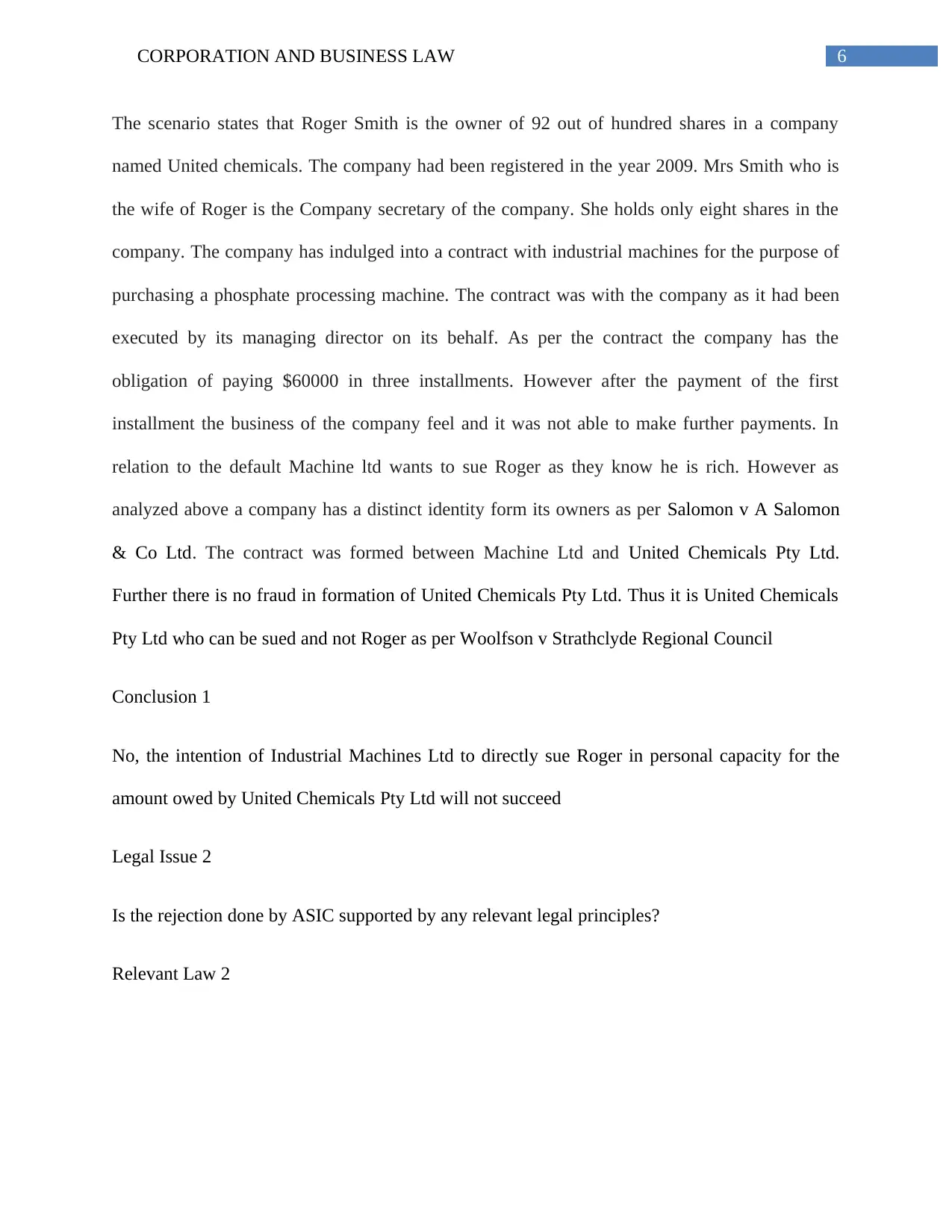
6CORPORATION AND BUSINESS LAW
The scenario states that Roger Smith is the owner of 92 out of hundred shares in a company
named United chemicals. The company had been registered in the year 2009. Mrs Smith who is
the wife of Roger is the Company secretary of the company. She holds only eight shares in the
company. The company has indulged into a contract with industrial machines for the purpose of
purchasing a phosphate processing machine. The contract was with the company as it had been
executed by its managing director on its behalf. As per the contract the company has the
obligation of paying $60000 in three installments. However after the payment of the first
installment the business of the company feel and it was not able to make further payments. In
relation to the default Machine ltd wants to sue Roger as they know he is rich. However as
analyzed above a company has a distinct identity form its owners as per Salomon v A Salomon
& Co Ltd. The contract was formed between Machine Ltd and United Chemicals Pty Ltd.
Further there is no fraud in formation of United Chemicals Pty Ltd. Thus it is United Chemicals
Pty Ltd who can be sued and not Roger as per Woolfson v Strathclyde Regional Council
Conclusion 1
No, the intention of Industrial Machines Ltd to directly sue Roger in personal capacity for the
amount owed by United Chemicals Pty Ltd will not succeed
Legal Issue 2
Is the rejection done by ASIC supported by any relevant legal principles?
Relevant Law 2
The scenario states that Roger Smith is the owner of 92 out of hundred shares in a company
named United chemicals. The company had been registered in the year 2009. Mrs Smith who is
the wife of Roger is the Company secretary of the company. She holds only eight shares in the
company. The company has indulged into a contract with industrial machines for the purpose of
purchasing a phosphate processing machine. The contract was with the company as it had been
executed by its managing director on its behalf. As per the contract the company has the
obligation of paying $60000 in three installments. However after the payment of the first
installment the business of the company feel and it was not able to make further payments. In
relation to the default Machine ltd wants to sue Roger as they know he is rich. However as
analyzed above a company has a distinct identity form its owners as per Salomon v A Salomon
& Co Ltd. The contract was formed between Machine Ltd and United Chemicals Pty Ltd.
Further there is no fraud in formation of United Chemicals Pty Ltd. Thus it is United Chemicals
Pty Ltd who can be sued and not Roger as per Woolfson v Strathclyde Regional Council
Conclusion 1
No, the intention of Industrial Machines Ltd to directly sue Roger in personal capacity for the
amount owed by United Chemicals Pty Ltd will not succeed
Legal Issue 2
Is the rejection done by ASIC supported by any relevant legal principles?
Relevant Law 2
Paraphrase This Document
Need a fresh take? Get an instant paraphrase of this document with our AI Paraphraser
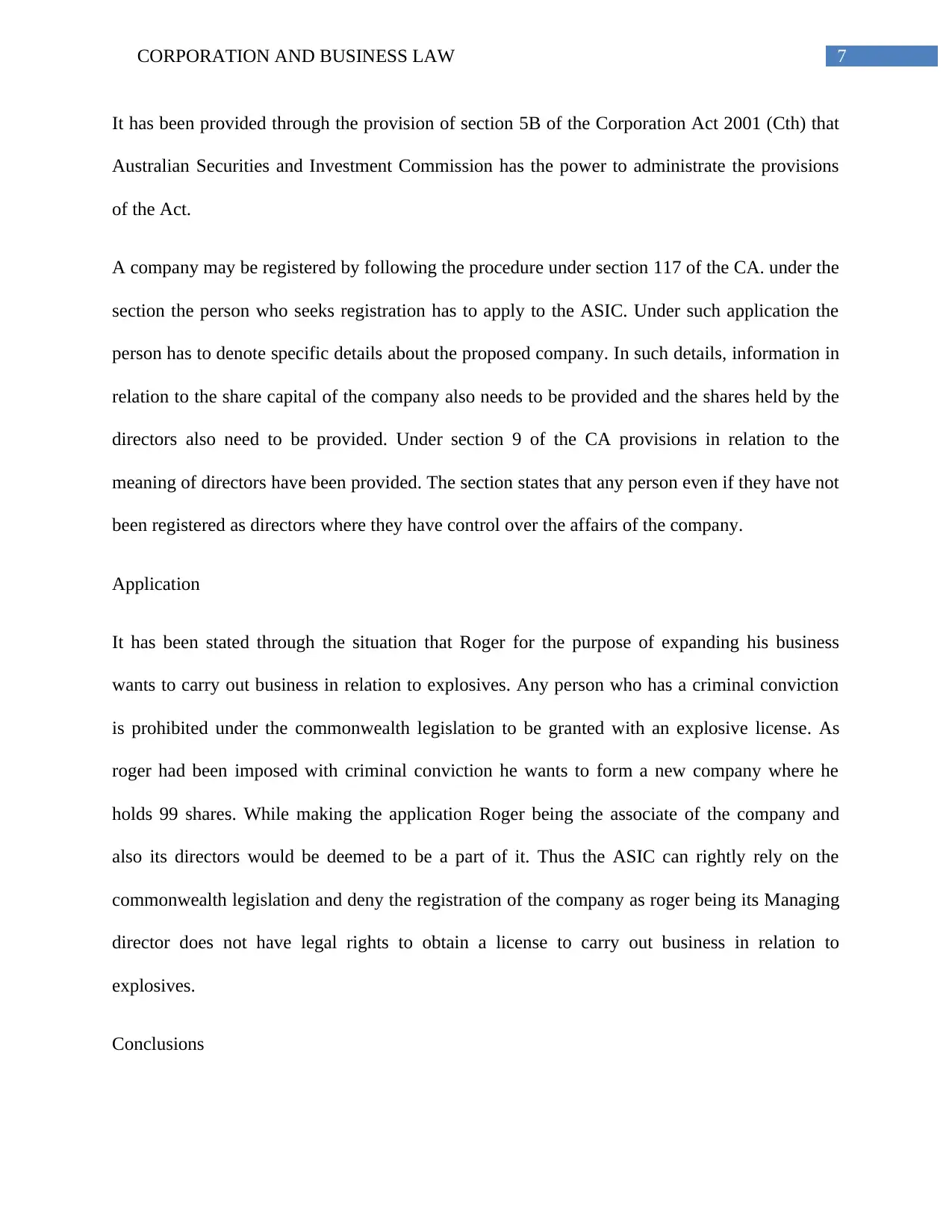
7CORPORATION AND BUSINESS LAW
It has been provided through the provision of section 5B of the Corporation Act 2001 (Cth) that
Australian Securities and Investment Commission has the power to administrate the provisions
of the Act.
A company may be registered by following the procedure under section 117 of the CA. under the
section the person who seeks registration has to apply to the ASIC. Under such application the
person has to denote specific details about the proposed company. In such details, information in
relation to the share capital of the company also needs to be provided and the shares held by the
directors also need to be provided. Under section 9 of the CA provisions in relation to the
meaning of directors have been provided. The section states that any person even if they have not
been registered as directors where they have control over the affairs of the company.
Application
It has been stated through the situation that Roger for the purpose of expanding his business
wants to carry out business in relation to explosives. Any person who has a criminal conviction
is prohibited under the commonwealth legislation to be granted with an explosive license. As
roger had been imposed with criminal conviction he wants to form a new company where he
holds 99 shares. While making the application Roger being the associate of the company and
also its directors would be deemed to be a part of it. Thus the ASIC can rightly rely on the
commonwealth legislation and deny the registration of the company as roger being its Managing
director does not have legal rights to obtain a license to carry out business in relation to
explosives.
Conclusions
It has been provided through the provision of section 5B of the Corporation Act 2001 (Cth) that
Australian Securities and Investment Commission has the power to administrate the provisions
of the Act.
A company may be registered by following the procedure under section 117 of the CA. under the
section the person who seeks registration has to apply to the ASIC. Under such application the
person has to denote specific details about the proposed company. In such details, information in
relation to the share capital of the company also needs to be provided and the shares held by the
directors also need to be provided. Under section 9 of the CA provisions in relation to the
meaning of directors have been provided. The section states that any person even if they have not
been registered as directors where they have control over the affairs of the company.
Application
It has been stated through the situation that Roger for the purpose of expanding his business
wants to carry out business in relation to explosives. Any person who has a criminal conviction
is prohibited under the commonwealth legislation to be granted with an explosive license. As
roger had been imposed with criminal conviction he wants to form a new company where he
holds 99 shares. While making the application Roger being the associate of the company and
also its directors would be deemed to be a part of it. Thus the ASIC can rightly rely on the
commonwealth legislation and deny the registration of the company as roger being its Managing
director does not have legal rights to obtain a license to carry out business in relation to
explosives.
Conclusions
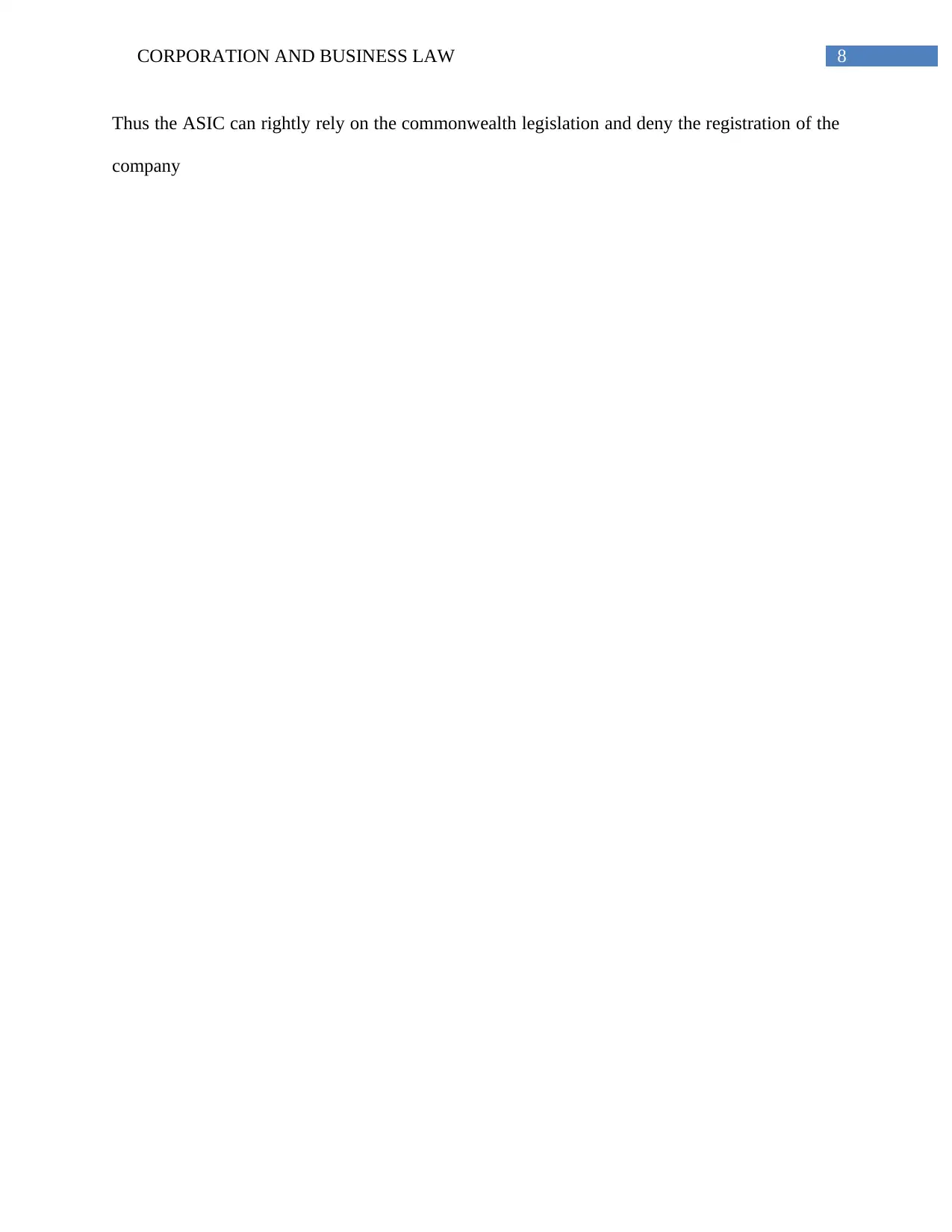
8CORPORATION AND BUSINESS LAW
Thus the ASIC can rightly rely on the commonwealth legislation and deny the registration of the
company
Thus the ASIC can rightly rely on the commonwealth legislation and deny the registration of the
company
⊘ This is a preview!⊘
Do you want full access?
Subscribe today to unlock all pages.

Trusted by 1+ million students worldwide
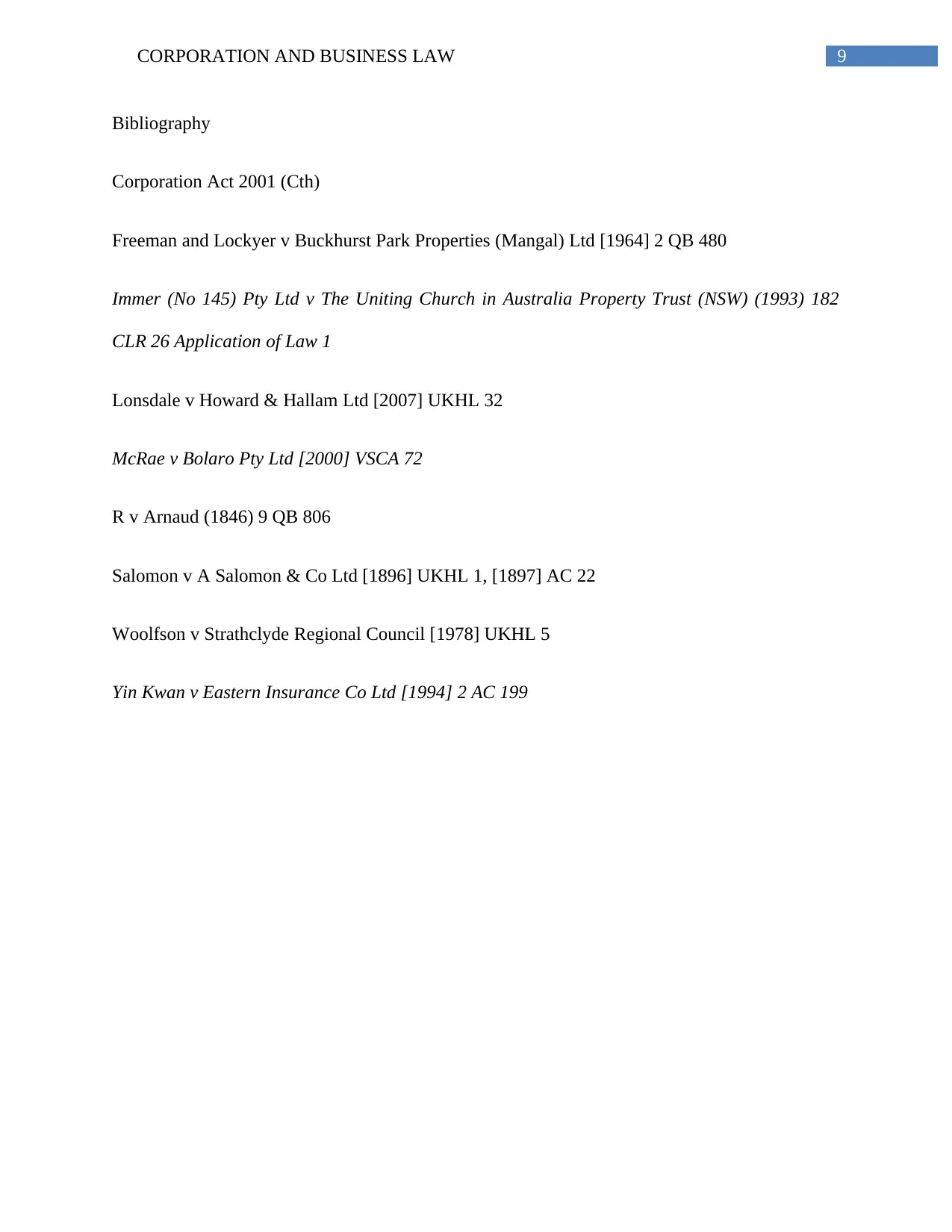
9CORPORATION AND BUSINESS LAW
Bibliography
Corporation Act 2001 (Cth)
Freeman and Lockyer v Buckhurst Park Properties (Mangal) Ltd [1964] 2 QB 480
Immer (No 145) Pty Ltd v The Uniting Church in Australia Property Trust (NSW) (1993) 182
CLR 26 Application of Law 1
Lonsdale v Howard & Hallam Ltd [2007] UKHL 32
McRae v Bolaro Pty Ltd [2000] VSCA 72
R v Arnaud (1846) 9 QB 806
Salomon v A Salomon & Co Ltd [1896] UKHL 1, [1897] AC 22
Woolfson v Strathclyde Regional Council [1978] UKHL 5
Yin Kwan v Eastern Insurance Co Ltd [1994] 2 AC 199
Bibliography
Corporation Act 2001 (Cth)
Freeman and Lockyer v Buckhurst Park Properties (Mangal) Ltd [1964] 2 QB 480
Immer (No 145) Pty Ltd v The Uniting Church in Australia Property Trust (NSW) (1993) 182
CLR 26 Application of Law 1
Lonsdale v Howard & Hallam Ltd [2007] UKHL 32
McRae v Bolaro Pty Ltd [2000] VSCA 72
R v Arnaud (1846) 9 QB 806
Salomon v A Salomon & Co Ltd [1896] UKHL 1, [1897] AC 22
Woolfson v Strathclyde Regional Council [1978] UKHL 5
Yin Kwan v Eastern Insurance Co Ltd [1994] 2 AC 199
1 out of 10
Related Documents
Your All-in-One AI-Powered Toolkit for Academic Success.
+13062052269
info@desklib.com
Available 24*7 on WhatsApp / Email
![[object Object]](/_next/static/media/star-bottom.7253800d.svg)
Unlock your academic potential
Copyright © 2020–2026 A2Z Services. All Rights Reserved. Developed and managed by ZUCOL.

